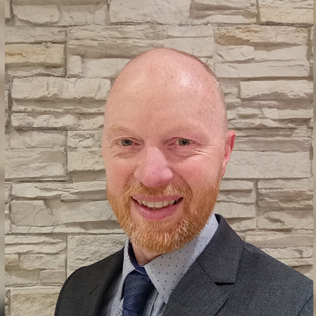Earlier this year, Queen Mary was proud to be recognised at the National Higher Education Awards, where Michael Page, Professor in Medical Education, was honourably named a National Teaching Fellow (NTF). This prestigious accolade — the highest individual award for teaching in UK higher education — highlights his significant contributions to curriculum design, clinical education, and the advancement of online learning. We spoke with him about his vision and values in advancing medical education.
Professional vision: elevating the status of teaching
“It’s rewarding to know that teaching really matters, and that we can achieve similar visibility as research-focused academics,” Michael reflects.
He has worked in medical education for over 15 years, shaping professional development programmes for clinicians at various stages of their careers. At the core of his vision is the belief that teaching is not an “add-on” to clinical practice but a professional identity in its own right.
“All doctors teach, but only some are explicitly recognised as educators, and education is not always esteemed in the way that, say, research or clinical leadership and management might be,” he explains. “Part of my mission is to raise the professional status of medical and clinical education, moving it beyond quick tips or one-off CPD workshops, and instead developing a rich professional identity for those who teach – an identity that takes them beyond a narrow focus on teaching and learning techniques in their immediate context, and fosters a broad collegiality through engagement with educators beyond their current disciplinary or institutional setting. Importantly, it should cause clinical educators to question the received wisdom and established practices in their educational domain and encourage them to experiment and innovate in their field.”
This commitment has informed much of his curriculum work. As well as introducing clinical educators to a distinctive body of professional knowledge, Michael seeks to help them recognise the bigger picture that shapes their teaching philosophy so they can reflect critically on their practice and imagine new ways to support learning in healthcare.
Curriculum design: opportunities and challenges
When asked about the challenges in designing and delivering the learning experience, Michael pointed out that working with highly capable clinicians, who often teach while juggling heavy workloads, requires careful planning.
“My students already know more than they think they know. The opportunity is to help them understand their own practice better, reflect critically on it, and see themselves as part of a wider professional endeavour.”
This approach has led him to develop innovative programmes, including apprenticeship routes and postgraduate courses, often in collaboration with NHS partners. He describes curriculum design as an act of professionalisation — ensuring that educational programmes not only give clinicians practical strategies but also enhance the credibility and recognition of education within healthcare.
Online education: a space for flexibility and principles
Working closely with the Digital Education Studio, Michael has been the leading pioneer of the flexible, high-quality online MA Medical Education. He believes that digital learning tools and systems provide unique opportunities to align teaching with core principles.
“I often use if-then statements when designing a programme. For example, if I believe my learners are autonomous, self-directed adults, then I shouldn’t treat them like children by monitoring every click or enforcing rigid attendance. Instead, I should give them the flexibility to shape their own learning.”
This philosophy has guided the creation of an online medical education programme at Queen Mary, where clinicians balance demanding professional roles with academic development. By designing for autonomy and inclusivity, Michael has built what he hopes is “a gold-standard online learning experience” — one that respects the realities of clinical life while maintaining academic rigour. He credits working alongside Dr Jo Elliott from the Digital Education Studio as pivotal in holding firm to these principles, especially in ensuring that flexibility and learner autonomy remained central to the programme’s design.
Collaboration, mentorship, and gratitude
Despite his individual recognition, the award-winning educator is quick to highlight that his achievements are collective. Michael credits colleagues across Faculty of Medicine and Dentistry and Queen Mary Academy, NHS partners, and his students for shaping his work. He also points to key mentors such as Professor Jo Brown, Professor Emerita in Medical Education and herself a National Teaching Fellow, and Professor Danë Goodsman, Professor in Medical Education, whose guidance and coaching were central to his development as an educator.
“No one achieves these things alone. Everything I’ve done has been in collaboration with others. If I’ve provided a focus for their energies and ambitions, then it’s only because of the remarkable colleagues and students I’ve worked alongside.”
Words to aspiring NTFs
For staff in the Faculty of Medicine and Dentistry who aspire to follow in his footsteps, his advice is both practical and reflective. He encourages colleagues to take advantage of the strong institutional infrastructure for teaching development, from Queen Mary Academy mentoring, and to work steadily towards professional recognition such as Advance HE Fellowships.
At the same time, he urges aspiring educators to think deeply about their values. “Early in your career, the focus is often on outputs and impact. Later, recognition comes from your vision and values. Don’t wait until then — start now. Ask yourself what kind of educator you want to be, and whether your work reflects who you are as a person. If it does, then the work itself becomes the reward; recognition, when it comes, is simply the icing on the cake.”
Looking ahead
Michael remains enthusiastic about the future of medical education and online learning at Queen Mary. His NTF award is not just a personal milestone but a signal of the university’s growing reputation for teaching excellence. For colleagues and students alike, his journey is a reminder that teaching can be transformative, that collaboration matters, and that values lie at the heart of meaningful education.
